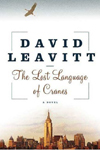

 |
The
Lost Language of Cranes - David Leavitt
|
 |
|
Cerisaye's Review This is a novel about urban gay life, but its focus is family relationships more than romance or sex. What happens when long held secrets are revealed, and is it better to live a lie than tell uncomfortable truths? The book says a lot about love and sexual identity and has beautifully realised characters. Leavitt writes in that way that creeps up on you. You finish and you’re still thinking about it. Rose and Owen are a New York couple of 50-something old marrieds. They face an uncertain future when told they must buy or be evicted from the apartment they’ve lived in for 25 years. Faded and grey like their surroundings, they’re empty, passionless, devoid of emotion, painfully repressed. They live separate lives, barely talking to each other in that exhausted way, when couples have nothing more to say. Language links apparently disparate elements in a structured narrative. We identify with troubled characters given room to grow into our consciousness. Deep themes concerning child abandonment, adoption and childhood speech, form layers in a provocative examination of what makes us who we are. 25 year-old gay son, Philip, daren’t tell Rose and Owen about his sexuality- secrecy so ingrained he keeps gay books hidden in his apartment. Until college Philip’s sex life was solitary, coming out like burning a bridge to any chance of ‘normal’ life. Yet Philip yearns for a man to relieve his overwhelming desire for love and touch. He needs someone who speaks his language. When he was 17 he went to a porn theatre and heard vocalised, in screams and grunts, words Philip dare not whisper, his day job, ironically, editing steamy het romance novels. Rose is also a book editor, a pedant who uses pleasure in finding the right words to mask complete failure to communicate with husband or son. I think she knows the truth but chooses not to see. Owen is a closet homosexual tormented by a forbidden desire he allows expression every Sunday, but only with strangers, casual, anonymous, sex without words. Employed by a selective boy’s school, Owen coaxes tongue-tied adolescents to speak at interviews for an institution his son fled because he couldn’t fit in. Owen maintains emotional distance with Philip, afraid to get close in case homosexuality somehow rubs off, that his love would be interpreted as something sick and perverse. The catalyst to Philip’s coming out is new lover, Eliot, raised by Derek, a gay man writing children’s fantasy stories. Did Eliot’s environment determine his sexuality, living embodiment of Owen’s fear? Or are we born with sexual orientation pre-determined? How can a parent reject a child just because he/she’s gay? What if the child is adopted, like Jerene, Eliot’s lesbian roommate, driven to make sense of abandonment through study of lost languages? Central to the themes of this ambitious novel is the strange story of crane-child, Michel, an infant abandoned by a junkie mother. Left to watch cranes operating outside his window, he copied moves and imitated sounds, his unique language. As a mentally handicapped adolescent, only cranes made Michel happy. So, each of us finds what it is he must love, and loves it. Whatever it is we love, that is what we are. It’s not sexuality that destroys families and tears us apart inside, but secrets and deception, pretending to be what we’re not. Only by learning to accept ourselves and each other, as we are, can we be free to love, unconditionally. And this is where romance becomes part of the story, as Philip discovers the man he was always meant to be. Recommended.
|